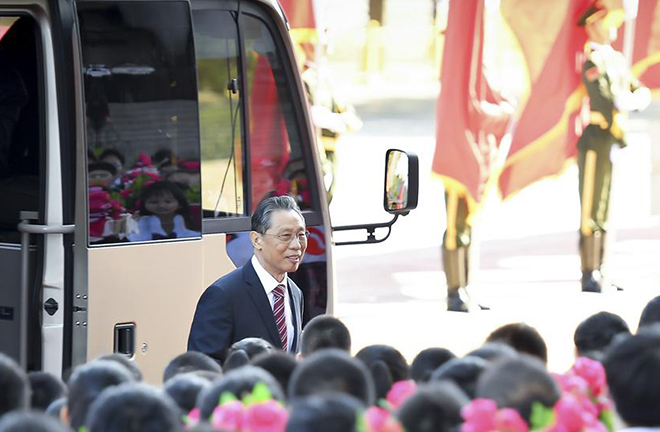China commends role models in COVID-19 fight

Zhong Nanshan, recipient of the Medal of the Republic, arrives at the Great Hall of the People in Beijing, Sept. 8. Photo: Li Xiang/XINHUA
China held a ceremony on Sept. 8 in Beijing to commend role models in the country’s fight against the COVID-19 epidemic.
President Xi Jinping, also general secretary of the Communist Party of China (CPC) Central Committee and chairman of the Central Military Commission, awarded the Medal of the Republic and national honorary titles at the Great Hall of the People.
Xi also delivered a speech at the meeting, attended by about 3,000 people.
China has made major strategic achievements in the battle against COVID-19, demonstrating the notable advantages of the CPC leadership and the country’s socialist system, the great strength of the Chinese people and the Chinese nation, the profound heritage of Chinese civilization, and the nation’s sense of duty as a major and responsible country, Xi said.
He called for transforming the virus-fighting spirit into tremendous strength to build a modern socialist country and to achieve national rejuvenation.
A total of 1,499 individuals, 500 groups, 186 CPC members and 150 primary-level Party organizations were commended for their roles in fighting the epidemic. Another 14 Party members were posthumously awarded.
Renowned respiratory disease expert Zhong Nanshan received the Medal of the Republic, the highest state honor.
The national honorary title, “the People’s Hero,” was conferred to three other outstanding medical professionals: Zhang Boli, a traditional Chinese medicine expert who presided over the research of the COVID-19 treatment plan combining traditional Chinese medicine and Western medicine; Zhang Dingyu, head of Wuhan’s designated coronavirus-treating Jinyintan Hospital; and Chen Wei, a military medical scientist who made major achievements in COVID-19-related basic research and the development of a vaccine and preventative medicines.
China’s fight against the epidemic has not relied on merely one department or one system; rather, under overall Party leadership, the entire country and all the people have been mobilized, fighting a coordinated nationwide battle against the epidemic.
The meeting not only demonstrated the Party and government’s recognition and encouragement of all those who have fought against the epidemic, but also raised the awareness of building a strong public health system throughout society, said Lu Xiang, vice president of Nanjing Medical University. He suggested that the government should increase investment in the construction of the public health system and improve the disease prevention and control system. A mechanism for major epidemic prevention and control needs to be established to fundamentally improve the existing system and to strengthen the public health system in China.
From Wuhan to northeast China and then Urumqi, Qiu Haibo, deputy Party secretary of Zhongda Hospital affiliated with Southeast University, fought four times on the front line for a total of 185 days beginning in January. At the award ceremony, he earned the honorary titles of national outstanding individual in fighting COVID-19 and national outstanding Party member.
Qiu said that representatives from the national disease control department arrived in Wuhan on Dec. 31, 2019, and in the following week confirmed the cause of COVID-19, detected the virus’s genome sequencing and reported it to the World Health Organization. After the sequencing was discovered, test kits were quickly produced, which is of great significance for the early clinical diagnosis of COVID-19 and the prevention and control of the epidemic.
Chinese medical workers have cooperated with other countries and made achievements in research on medical treatment strategies and on new diseases, said Ning Guang, an Academician of the Chinese Academy of Engineering. These research results were published internationally in a timely manner, sharing the country’s experience to aid the global fight against the pandemic.
According to Wang Yong, director of the Center for International Politics and Economics at Peking University, China’s assistance to other countries demonstrates the concept of Great Harmony in the refined traditional Chinese culture and also reflects China’s image and commitment as a responsible major power.
Economic globalization has entered a critical period, and the pandemic has had a major impact on its direction, Wang continued. Countries should strengthen cooperation in public health system construction, international biosecurity and internet development. While maintaining the basic momentum of economic globalization, countries need to promote the mutual adaptation of their domestic economies and globalization, by adjusting policies in a timely manner according to their national conditions and by promoting political, economic and social changes.
Edited by JIANG HONG
